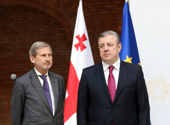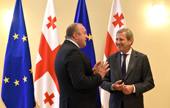
European school opens in Georgia
By Gvantsa Gabekhadze
Monday, May 8
“A European school will open in Georgia which will be of regional importance and ensure high quality education,” Georgia’s Prime Minister Giorgi Kvirikashvili stated after meeting with the EU High Commissioner, Johannes Hahn, in Tbilisi last week.
Kvirikashvili stated that the idea of opening the school belonged to Hahn, and the education institution would open in September next year.
Hahn himself highlighted the importance of high-quality education for the progress of any country.
“No country can achieve sustainable economic progress and build a prosperous future without substantial investment in people through education and learning. Education enriches people’s understanding of reality and broadens their horizon. It improves the quality of their lives and leads to social benefits both for individuals and the whole society,” Hahn said.
He stressed that in 2016, 4,100 Eastern Partnership (EaP) students and academic staff have been supported to study, teach or follow training in the EU, out of which 990 came from Georgia.
Hahn added that around 8,900 young people and youth workers have taken part in informal education projects such as exchanges, training and volunteering, with 1,600 of them from Georgia.
Meanwhile, the EU will allocate 32 million euros to support the Georgia-EU Association Agreement implementation process.
A relevant document was signed by Hahn and Georgia’s Minister for European and Euro-Atlantic Integration, Viktor Dolidze, during the visit.
While in Tbilisi, Hahn also met President Giorgi Margvelashvili, members of the parliamentary opposition and civil sector representatives.
The President’s administration stated that Hahn and Margvelashvili discussed Georgia-EU relations, the successful completion of the visa liberalization process, future steps planned within the Georgia-EU Association Agreement and the prospects of further strengthening cooperation.
“The parties have also discussed the constitutional amendment reform and President Margvelashvili has informed Mr. Hahn about his views on the process. In turn, Mr. Hahn has underlined the necessity of active public involvement and broad consensus in the constitutional review process,” the President’s press office reported.
The opposition also stated that one of the key issues of the meeting with Hahn was the planned amendments to be made to the country’s Constitution.
They stressed they informed the EU Commissioner about their “negative view” over the changes, especially those ones related to the indirect presidential elections, the prohibition of election blocs, maintaining the five percent election threshold, the relocation of Parliament from Kutaisi to Tbilisi and giving all undistributed mandates (calculated from the votes gained by the parties who failed to overcome the election threshold) to the party that will gain first place.


